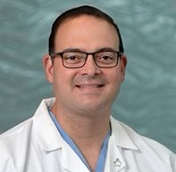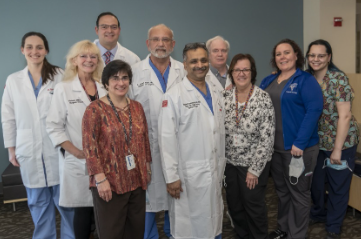We currently have several academic programs available. Call 401-456-2484 for more information.
Complex General Surgical Oncology Fellowship
All five of our specialists completed Surgical Oncology fellowships, three of whom were trained here at Roger Williams.
Surgical Oncology Research Fellowship
- Fully funded for one year with option for 2nd year
- Research projects will focus on the response of immune cells to intrahepatic tumors
- Attend conferences with our Society of Surgical Oncology Fellows
- Training for independent study design, abstract preparation, manuscript production, and oral presentations
Surgical Clerkship
Surgical clerkships are offered at Roger Williams Medical Center for third and fourth year students currently enrolled in qualified allopathic and osteopathic medical schools in the United States. The objective of the clerkship is to provide knowledge of and experience with surgical diseases, enhancing the student's understanding of the relevant diagnostic and management principles. Emphasis is placed on the totality of care including the pre-surgical visit, intraoperative care, and postoperative management. The student will gain experience in both the outpatient and inpatient setting.
- Formulate and present diagnostic and therapeutic plans and record such under direct supervision.
- Student will accompany the preceptor on rounds, conferences and consultations.
- Learn how to interview, assess, and examine surgical patients.
- Students will have the opportunity to suggest appropriate and cost-effective laboratory, radiographic, and other testing and to write orders for such under direct supervision.
- Understand the basic principals of surgical care in the operating room and learn how to assist effectively.
- The student must maintain a log of patient encounters, procedures performed, lectures attended and readings accomplished.
Surgical Oncology Elective
The overall objective of this rotation is to educate fourth-year students how to provide effective multi-disciplinary care for patients with complex malignant diseases. This rotation will provide medical students the opportunity to develop an in-depth understanding of the diagnosis and treatment of the patient with common forms of cancer. We will emphasize the integration of molecular biology into the prognosis and treatment of cancer, including advanced, locally recurrent and some less common neoplasms.
Instructional Features
An ever-increasing amount of patient care occurs in the outpatient setting, where the majority of diagnostic, work-up and treatment decisions are made. Therefore, students will be assigned two half-days per week in our outpatient clinic. Students will be expected to follow and assist an attending (on a one-to-one basis) as he/she sees patients and performs minor outpatient surgeries.
Students will participate in daily morning and evening inpatient rounds with the fellows, residents and surgical oncology nurses. Students will be encouraged to follow patients they have seen in the outpatient clinic and will be expected to read about the particular cancer in patients that they follow. Suggested readings will be available.
Students will be encouraged to maximize time in the operating room. It is expected that they will read about the disease, operative procedure, and relevant anatomy prior to coming to the operating room for all elective cases. Students are expected to attend the Division of Surgical Oncology academic conferences held on Monday afternoon of each week. At these meetings, students will be asked to deliver a 20 minute presentation on an assigned topic. Students will present a case and review a topic at one of our weekly meetings.
Assessment
The evaluation of each student will be based upon his/her participation in the aforementioned activities. No formal test or written assignment will be given; rather, the evaluation will be derived from a combination of the student’s ability to demonstrate a logical approach to cancer patient care, preparedness for oral presentations and for the operating room, diligence, and evidence of concern for patients’ well-being.


